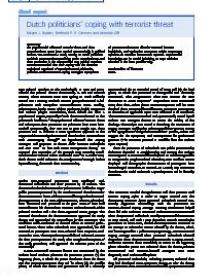Dutch politicians’ coping with terrorist threat
The psychosocial effects of terrorist threat and close protection have never been studied systematically in political leaders. We conducted a study among 12 Dutch politicians and their partners who were living under terrorist threat and close protection in the aftermath of two political murders. Interviews revealed that their coping with the situation varied and consisted of emotion-focused, defensive, palliative and instrumental coping strategies. Symptoms of post-traumatic stress disorder occurred in some individuals, and tendencies to express milder or stronger opinions on sensitive issues were reported. Psychosocial knowledge can be useful in helping to cope with the situation in the best possible way.
Geachte bezoeker,
De informatie die u nu opvraagt, kan door psychotraumanet niet aan u worden getoond. Dit kan verschillende redenen hebben,
waarvan (bescherming van het) auteursrecht de meeste voorkomende is. Wanneer het mogelijk is om u door te verwijzen naar de bron
van deze informatie, dan ziet u hier onder een link naar die plek.
Als er geen link staat, kunt u contact opnemen met de bibliotheek,
die u verder op weg kan helpen.
Met vriendelijke groet,
Het psychotraumanet-team.
In: The British Journal of Psychiatry, ISSN 0007-1250 | 197 | 4 | 328-329
http://bjp.rcpsych.org/content/197/4/328.short


